语法精讲与精练
Unit+2+单元语法精讲与精练+单元写作小专题课件-2023-2024学年人教版英语八年级上册

单元语法知识精讲 频度副词的用法
1.频度副词的含义 (1)表示次数、频率的副词称为频度副词。常用的频度副词按频率发生的 高 低 依 次 为 : always(100%)>usually(80%)> sometimes(60%)> seldom(30%)> hardly ever(10%)> never(0%)。 (2)表示具体的频率、次数时,一次用 once,两次用 twice,三次或三次以 上用“基数词+times”表示:three times,four times,six times 等。
ห้องสมุดไป่ตู้
热点写作演练 假设你是李华,请给你的美国笔友 Tom 写一封信,谈谈你的课余时间参 加课外活动的情况。 内容包括: 1.介绍你们学校开展的课外活动; 2.叙述你的一次课外 活动经历; 3.说说你的体会。
要求:1.语言通顺,意思连贯,书写规范;2.80 词左右。书信开头 和结尾已给出,不计入总词数。
Dear Tom, How's it going?Let me tell you something about our after-school
activities.
WWeehahvaevelotlostsofoaf ftaeftrers-scchhooooll aaccttiiviittieisesininoouurr sscchhooooll ffoorr ouurr ffrreee ttiimmee..TThheerreeaarereovoevre2r02s0tusdteundtesn'tcslu'bcsliunbosuirnscohuorosl.cThhoeorle.aTrheearret acrluebasr,t cblauskbest,bablal sckluebtbs,alml ucslicubcslu,bmsuasnidc scolounbs.I aonftdensoexoernc.iIseoifntmeny efrxeeerctiimse iandmyI farmeeintitmhee abnadskIetabmalilnatnhde cbhaessksectlbuablsl.Waendofctheensshacvleubas.bWaeskoeftbtaelnl hmaavtechaonbaFsrkiedtabya.AllftemraetvcehryongaFmrei,dawy.eAafrteevrereyvetirryedgbamuet ,exwceiteadr.We hvaetr'ys tmiorreed, bIutalesoxcpiltaeyd.cWhheasts'ws imtohrem,yI callassompaltaeys cthhersees wtiimthesmya cwlaeesksmaftteesr tschhroeoel.times a w
专题16 简单句-小学语法精讲精练(附口诀、练习和答案)

小学语法精讲精练专题16 简单句思考引入老师,我们上一课学了句子成分,那今天我们是不是学习如何用这些成分造句呀?是的!我们不仅要搞清楚句子成分,还要知道有哪些句型才能造句呢。
我们把句子的5种基本成分组合在一起就变成了简单句的5种基本句型。
这就是我们今天学习的重点--简单句。
简单句,简单句肯定就不难啦,我应该能学会!哈哈哈!那你可得好好听了。
知识概览知识精讲一、简单句的基本含义简单句是只含有一个主谓结构的句子,并且句子各成分只由单词或短语构成。
I have a basketball.我有一个篮球。
主语谓语My family and I live in China.我的家人和我都住在中国。
主语谓语热身小练①找一找。
请你找出下列句子的主语和谓语,并写在横线上。
1. The bus comes.主语:__________________ 谓语:__________________2.I drink a cup of coffee.主语:__________________ 谓语:__________________答案:1.The bus comes 2.I drink二、简单句的五种基本句型根据不同的谓语动词以及句子成分的不同组成方式,简单句可分为以下5种基本句型。
1.主语+谓语Class begins.开始上课了。
Sarah laughs.萨拉笑了。
这种句型的谓语一般是不及物动词,后面不需跟宾语就能使句子意义完整。
小学阶段常见的不及物动词有:3.主语+系动词+表语I am a student.我是一名学生。
He is a pilot.他是一名飞行员。
They are friends.他们是朋友。
这种句型的谓语由“系动词+表语”共同构成,主要用来说明主语的性质、特征、状态或身份等。
小学阶段我们需要掌握的系动词就是be动词。
4.主语+谓语+间接宾语+直接宾语Tom gives me a book.汤姆给了我一本书。
专题06语法精讲精练(教师版)七年级下册期中考试复习宝典(人教版)含答案
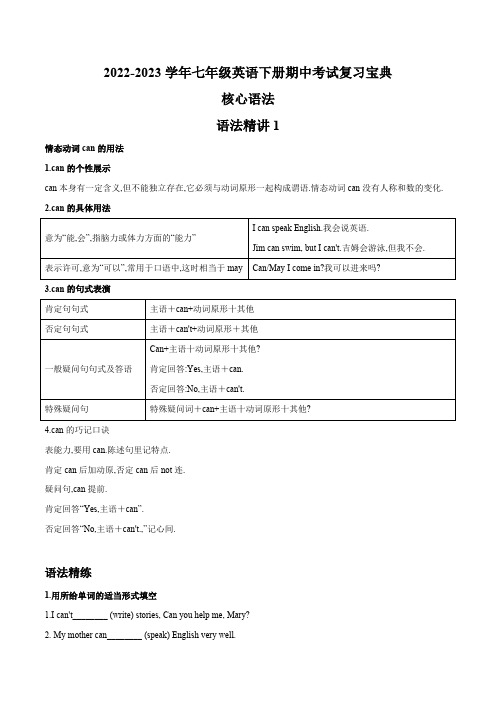
2022-2023学年七年级英语下册期中考试复习宝典核心语法语法精讲1情态动词can的用法1.can的个性展示can本身有一定含义,但不能独立存在,它必须与动词原形一起构成谓语.情态动词can没有人称和数的变化.2.can的具体用法意为“能,会”,指脑力或体力方面的“能力”I can speak English.我会说英语.Jim can swim, but I can't.吉姆会游泳,但我不会.表示许可,意为“可以”,常用于口语中,这时相当于may Can/May I come in?我可以进来吗?3.can的句式表演肯定句句式主语+can+动词原形十其他否定句句式主语+can't+动词原形+其他一般疑问句句式及答语Can+主语十动词原形十其他?肯定回答:Yes,主语+can.否定回答:No,主语+can't.特殊疑问句特殊疑问词+can+主语十动词原形十其他?4.can的巧记口诀表能力,要用can.陈述句里记特点.肯定can后加动原,否定can后not连.疑问句,can提前.肯定回答“Yes,主语+can”.否定回答“No,主语+can't.,”记心间.语法精练1.用所给单词的适当形式填空1.I can't________ (write) stories, Can you help me, Mary?2. My mother can________ (speak) English very well.3.What can your brother________ (do)?4.Miss Lin can't play the piano, but she can________ (sing)well.5.Little Tom can draw, but he________ (can not) dance.答案:1.1.write2.speak3.do4.sing5.can'tII.单项选择1.(2022·百色中考)- ________ you tell us a story in English?-I think I can do it. Let me try.A. NeedB. CanC. ShouldD. Must2.(2022·北京中考)- ________ I take photos here?-Sorry, you can't. It's not allowed in the museum.A. MustB. NeedC. CanD. Will3.We should learn some basic life skills since we________ depend on our parents some day.A. canB. can'tC. mustD. mustn't4. -What kind of music do you like?-I like music that I________ dance to.A. canB. mustC. shouldD. need5.(2022·成都中考)-There is a new art museum in our city. You________ miss it.-Thank you. I won't.A. can'tB. mustC. needn't答案:1.B 考查情态动词辨析.句意:-你能用英语给我们讲一个故事吗?-我认为我能.让我试试.need需要;can能; should应当;must必须.故选B.2.C 考查情态动词辨析.句意:-我能在这里拍照吗?-抱歉,你不能.博物馆不允许拍照.must必须;need需要;can能;will将.故选C.3.B 考查情态动词辨析.句意:既然我们有一天不能依靠父母,我们就应当学会一些基本的生活技能.can 能;can't不能;must必须;mustn't不应该.故选B.4.A 考查情态动词辨析.句意:-你喜欢哪种音乐?-我喜欢能伴着跳舞的音乐.can能;must 必须;should应当;need需要.故选A.5.A 考查情态动词辨析.句意:-我们城市有一个新的艺术博物馆.你不能错过它.-谢谢.我不会的.can't 不能;must 必须;needn't 不必.故选A.III.按要求改写句子(每空一词)1.My father can speak English well.(改为一般疑问句)________ your father________ English well?2.Tom can ride a horse.(改为否定句)Tom________ ________ a horse.3.Mr.Green can do Chinese kung fu.(对画线部分提问)________ ________ Mr. Green________?4.Can Tom and Jim draw pictures?(作肯定回答)Yes, ________ ________.5.play,can,Cindy,well,the,guitar(连词成句)___________________________________________________________________________________________?答案:1.Can;speak2. can't ride3.What can; do4.they can5.Can Cindy play the guitar well语法精讲2一、频度副词定义用来表示频率的副词,叫频度副词.常见的频度副词有:always, usually, often, sometimes, never 等通常在be 动词、助动词或情态动词之后He is always busy.他总是很忙.I will never forget you.我永远也不会忘记你.通常位于实义动词之前They often go swimming.他们经常去游泳.频度副词在句中的位置sometimes 可放在句首、句中或句尾Sometimes she watches TV.她有时看电视.提问how often 意为“多久一次”-How often do you drink milk?-你多久喝一次牛奶?-Every day.-每天.二、一般现在时定义表达现在的状态,主语的性格、能力以及经常或习惯性的动作等He usually takes the bus to school.主语是第三人称单数时,谓语动词用第三人称单数形式他通常乘坐公交车去上学.动词形They watch TV every day.态变化主语不是第三人称单数,谓语动词用原形他们每天都看电视.三、句式结构肯定句句式主语+be/行为动词+其他主语+be+ not+其他否定句句式主语+don't/doesn't+动词原形+其他句式结构Be+主语+其他?一般疑问句句式Do/Does+主语十动词原形十其他?语法精练1.用所给单词的适当形式填空1.Mary usually________ (go) shopping with her mother on Sunday.2. ________ (do)Peter________ (take)a shower in the evening or in the morning?3.Lisa________ (not do) her homework in the evening.4.She never________ (eat) hamburgers for lunch.5.-What time Jack________ (go) to bed?-At 10:30 p.m.答案:1.goes2.Does;take3.doesn't do4.eats5.does;goII.按要求改写句子(每空一词)1.Mr. Green usually goes to work at seven o'clock.(改为一般疑问句)________ Mr. Green usually________ to work at seven o'clock?2.Anna always plays volleyball after school.(改为否定句)Anna________ plays volleyball after school.3.I do my homework at home on weekends.(改为否定句)I________ ________ my homework at home on weekends.4.Lisa sometimes eats bread for breakfast.(对画线部分提问)________ ________ ________ Lisa________ bread for breakfast?5.They usually exercise in the morning.(用he改写句子)________ usually________ in the morning.答案:1.Does;go2.never3.don't do4.How often does; eat5.He;exercises语法精讲3一、how引导的特殊疑问句1.直接由how引导的特殊疑问句询问交通方式How does she get to school?她是如何到校的?询问身体状况How are your parents?你父母身体好吗?询问天气状况How is the weather today?今天天气怎么样?询问程度How do you like the TV show?你觉得这个电视节目怎么样?2.由“how+形容词/副词”引导的特殊疑问句how long意为“多长”,询问时间或物体的长度how far意为“多远”,询问距离how often意为“多久一次”,询问频率how old意为“多大”,询问年龄how many意为“多少”,询问可数名词的数量意为“多少”,询问不可数名词的数量how much意为“多少钱”,询问价格二、交通方式的表达1.take a/the+交通工具take a/the subway/bus/train/boat乘地铁/公共汽车/火车/船动词(短语)2.其他表达方式walk 步行ride a/the/one's bike 骑自行车drive a car 开车1.by+交通工具by bike骑自行车by car/bus/train/subway/boat乘车/公共汽车/火车/地铁/船2.in/on+限定词十交通工具介词(短语)on the bus 乘公共汽车in a car 乘车3.固定表达方式on foot 步行语法精练I.根据句意填写疑问词(组),完成句子1.- _________ does Linda get to school?-She takes the bus.2.- _________ _________ does it take you to get home from work?-About twenty minutes.3.- _________ _________ is it from here?-One hundred kilometers.4.-I walk to school. _________ about you, Jane?-I ride my bike.5.- _________ _________ people are there in the photo?-Six.答案:1.How2.How long3.How far4.How5.How manyII.单项选择1.(2022·安徽滁州凤阳博文国际学校期末) I usually_________ to the bus stop, and then go to school by bus.A. by bikeB. on my bikeC. in my bikeD. ride my bike2.- _________ does Bob usually go to work?-He usually rides his bike.A. WhatB. HowC. WhereD. Who3.(2022·浙江杭州萧山城区期中)-Excuse me. _________ is it to the East Station?-About half an hour by taxi.A. How manyB. How longC. How farD. How old4.- _________ do you visit Uncle Tom?-Once a week.A. How longB. How oftenC. How soon答案:1.D 考查动词短语的用法.句意:我通常骑自行车到公交站,然后坐公交上学.I后面需要一个动词短语.故选D.2.B 考查疑问词辨析.由答语“他通常骑自行车”可知,问句是询问上班的交通方式.故选B.3.C 考查疑问词组辨析.句意:-打扰一下.到东站有多远?--坐出租车大约半个小时.how many多少;how long 多久;how far多远;how old几岁.故选C.4.B 考查特殊疑问词组辨析.由答语“每周一次”可知,问句是询问“你多久拜访一次汤姆叔叔”.提问频率用how often.故选B.语法精讲4一、祈使句1.祈使句的定义表示请求、命令、建议、警告、劝说等的句子叫祈使句.在祈使句中,肯定句一般以动词原形开头,通常省略主语you;否定句在动词原形前加don't.2.祈使句的句式结构祈使句句式肯定句句式否定句句式P型:Please十动词原形十其他Please stand up.Please don't stand up.V型:动词原形十其他Look at the blackboard.Don't look at the blackboard.L型:Let+宾语十动词原形+其他Let her go.Don't let her go./ Let her not go.B型:Be+表语Be careful.Don't be late for class!N型:No+名词/动名词/No photos! No parking!3.祈使句用法口诀祈使句,祈使句,请求、命令或建议.主语是you常省去,动词原形开头记.否定形式要注意,句首要把don't加.要讲客气用please,句首、句末没关系.二、must和have to辨析1.两者均意为“必须”.must更强调说话者的主观意愿,have to强调客观需要,意为“不得不”.2.must一般只表示现在,没有人称和数的变化;而have to则可以用于不同的时态,有人称和数的变化.3.两者的否定式含义大不相同.mustn't 意为“不准;禁止”,而don't have to意为“不必”.【注意】以must开头的一般疑问句,其肯定回答用must;否定回答用needn't或don't have to.语法精练1.用所给单词的适当形式填空1. _________ (finish)your homework first.2. _________ (not come) to the zoo before 6 o'clock, please.3.Please_________ (be) quiet in the room.4.No_________ (swim) in the river!5.They have to_________ (do) their homework when they get home.答案:1.Finish2.Don't come3.be4.swimming5.doII.单项选择1.(2022·广西河池凤山期末) _________ play the guitar here, Jack. It's too noisy.A. Can'tB. NoC. Don'tD. Doesn't2.(2022·湖南郴州期末)-Jack, _________ leave the dirty dishes in the kitchen!-Sorry, Mom.A. can'tB. doesn'tC. don't3.(2022·湖南株洲攸县期末) _________ run in the hallway, children!A. Don'tB. NotC. Can't4.(2022·江西宜春期末)-Can I go out with Lisa, Dad?-Yes, but you_________ come back home before five o'clock, You'll have an art lesson then.A. mustB. canC. mustn'tD. can't5.(2022·浙江宁波海曙区期中)We_________ be noisy in the library and we_________ keep the books clean.A. have to; mustB. must; can'tC. have to; can'tD. can't; have to答案:1.C 考查祈使句.句意:不要在这里弹吉他,杰克.太吵了.祈使句的否定句是“Don't+动词原形”.故选C.2.C 考查祈使句.句意:-Jack,不要把脏餐具留在厨房里.-抱歉,妈妈.祈使句的否定句是“Don't+动词原形”.故选C.3.A 考查祈使句.句意:孩子们,不要在走廊里跑!祈使句的否定句是“Don't+动词原形”.故选A.4.A 考查情态动词辨析.句意:-爸爸,我可以和丽莎出去吗?--是的,但你必须在五点钟之前回家.那时你要上一节艺术课.故选A.5.D 考查情态动词辨析.句意:我们不能在图书馆里吵闹,我们必须保持干净.can't不能;have to不得不.故选D.语法精讲5一、形容词形容词修饰名词,用以说明事物或人的性质和特征.它通常在句子中作定语、表语或宾语补足语等.句中成分说明示例定语一般修饰名词,置于名词之前She is a happy girl.她是一个幸福的女孩.置于系动词(be, look, feel, sound等)之The girl is beautiful.这个女孩很漂亮.表语后,可以被程度副词very, too等修饰宾语补足语说明宾语的状态、特征等What makes you so happy?什么使你这么开心?二、特殊疑问句1.定义及答语特殊疑问词引导的疑问句叫特殊疑问句,其结构为“特殊疑问词十一般疑问句?”回答特殊疑问句不能用yes或no.回答时要针对具体情况来作出回答.2.特殊疑问词特殊疑问词分为两类:疑问代词和疑问副词,其用法归纳如下:Who意为“谁”,用于对主语(人称代词)进行提问Whom意为“谁”,用于对宾语(人称代词)进行提问When意为“何时”,用于对时间进行提问Where意为“哪里”,用于对具体地点进行提问How意为“怎样”,用于对方式进行提问Why意为“为什么”,用于对原因进行提问What意为“什么”,用于对某人的名字、职业等进行提问Which用于对“哪个;哪些”进行提问【注意】由why引导的特殊疑问句,一般要用because引导的从句来回答.because是连词,作“因为”讲,其后要接一个句子来陈述理由.例如:-Why does she do that?-她为什么要那样做?-Because she wants to help the person.-因为她想帮助那个人.语法精练I.单项选择1.(2022·江西赣州兴国期末)-Don't be_________. Jack! Help me clean the room right now!-OK, Mom.A. afraidB. lazyC. shyD. quiet2.(北京海淀区期中) _________ is Jenny from?-She comes from the US.A. WhatB. WhoC. WhenD. Where3.(2022·广西北海期末)- _________ do you like this book?-Because it's exciting.A. WhyB. WhatC. HowD. Who4.(2022·福建莆田期末)My brother is very_________. He can always make new things.A. smartB.busyC. kind5.- _________ was the car invented?-It was invented in 1885.A. WhenB. WhichC. WhoD. Where答案:1.B 考查形容词辨析.句意:-不要懒惰,杰克!立即帮助我清扫房间!-好的,妈妈.afraid害怕的;lazy懒惰的; shy害羞的;quiet安静的.故选B.2.D 考查特殊疑问词辨析.由答语“她来自美国”可知,问句是询问珍妮来自什么地方.对地方提问需用where.故选D.3.A 考查疑问词辨析.句意:-你为什么喜欢这本书?-因为它是令人兴奋的.why为什么;what什么;how怎样;who谁.故选A.4.A 考查形容词辨析.句意:我弟弟很聪明.他总是能制作新东西.smart聪明的;busy忙碌的;kind和蔼的.故选A.5.A 考查特殊疑问词辨析.由答语中的“在1885年”可知,问句是询问“汽车是什么时候被发明的”.对时间提问用when.故选A.II.对画线部分提问(每空一词)1.Linda doesn't like math because it's difficult._________ _________ Linda_________ math?2.I can see some books on the table._________ can you_________ on the table?3.Mr. Green often goes to work at 7:30 in the morning._________ _________ Mr. Green often go to work?4.Lions are from South Africa._________ _________ lions from?5.Most students go to school by bus._________ _________ most students go to school?答案:1.Why doesn't; like2.What;see3.When does4.Where are5.How do。
人教版九年级英语上册课件:Unit 6 单元语法精讲与精练(共9张PPT)
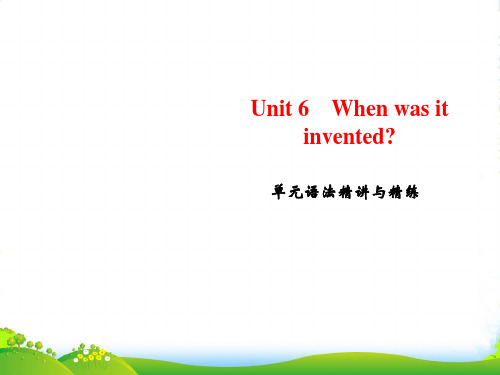
一般疑问句:Was/Were+主语+Vp.p +(by…)? eg:Was the light bulb invented by Edison?
电灯是爱迪生发明的吗? 回答为:Yes,主语+ was/ were; No,主语+ was/were+not.
特殊疑问句: (1)疑问词不作主语:疑问词+ was/were +主语 +Vp.p+ (by…)? eg:How was tea invented?茶是怎样被发明的? (2)疑问词作主语: 疑问词+ was/were +Vp.p+ (by…)? eg:When was computer invented? 电脑是什么时候发明的?
(make).Today most paper comes from trees.However,with the concern for the
environment (考虑到环境),more and more paper 3 (produce) from
recycled paper products.Since paper products are of different qualities,they first
7.His shoes _w_e_r_e__w_a_s_h_e_d__ (wash) by his sister yesterday. 8.I don't think he stole the painting.When he _w__a_s_a_s_k_e_d__ (ask) what he was doing at 9 o'clock yesterday evening,he was very calm. 9.As soon as she _w_a_s__o_ff_e_r_e_d_ (offer) a well-paid job,she called her parents to tell them the good news. 10.The passengers __w__e_re__to_l_d__ (tell) just now that the highway was closed because of the heavy snow.
高中英语语法专题精讲精练-动名词综述
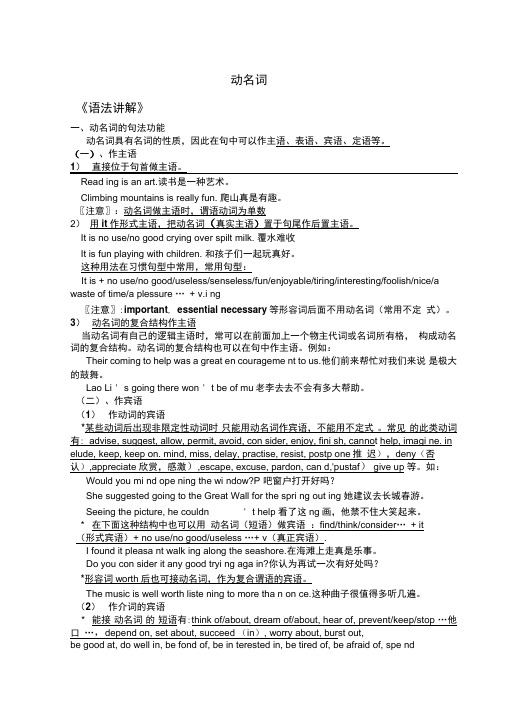
动名词《语法讲解》一、动名词的句法功能动名词具有名词的性质,因此在句中可以作主语、表语、宾语、定语等。
(一)、作主语1)直接位于句首做主语。
Read ing is an art.读书是一种艺术。
Climbing mountains is really fun. 爬山真是有趣。
〖注意〗:动名词做主语时,谓语动词为单数2)用it作形式主语,把动名词(真实主语)置于句尾作后置主语。
It is no use/no good crying over spilt milk. 覆水难收It is fun playing with children. 和孩子们一起玩真好。
这种用法在习惯句型中常用,常用句型:It is + no use/no good/useless/senseless/fun/enjoyable/tiring/interesting/foolish/nice/a waste of time/a plessure … + v.i ng〖注意〗:important, essential necessary等形容词后面不用动名词(常用不定式)。
3)动名词的复合结构作主语当动名词有自己的逻辑主语时,常可以在前面加上一个物主代词或名词所有格,构成动名词的复合结构。
动名词的复合结构也可以在句中作主语。
例如:Their coming to help was a great en courageme nt to us.他们前来帮忙对我们来说是极大的鼓舞。
Lao Li ' s going there won ' t be of mu老李去去不会有多大帮助。
(二)、作宾语(1)作动词的宾语*某些动词后出现非限定性动词时只能用动名词作宾语,不能用不定式。
常见的此类动词有: advise, suggest, allow, permit, avoid, con sider, enjoy, fini sh, cannot help, imagi ne. in elude, keep, keep on. mind, miss, delay, practise, resist, postp one推迟),deny(否认),appreciate 欣赏,感激),escape, excuse, pardon, can d,'pustaf) give up 等。
[全]高考英语语法精讲与精练-形容词和副词[全考点]
![[全]高考英语语法精讲与精练-形容词和副词[全考点]](https://img.taocdn.com/s3/m/3e10b3dbccbff121dc3683b0.png)
高考英语语法精讲与精练-形容词和副词一、形容词和副词讲前练:用所给单词的适当形式填空For many people,life is a lot [1]_____(easy)today.Medicine and diet are improving[2]______(quick),and people are getting [3]________(healthy) and living [4]______(long). But the area of life that is changing [5]___________(quickly) of all is communication. Fifty years ago, computers were much [6]_______ (big) and less [7]_________ (power) than they are now. Today, we use the internet, so we can communicate [8]___________(easy) with friends all over the world.Not all the changes are [9]___________(well) ones. More people drive cars instead of riding bikes, so they aren’t as [10]_________(fitness) as they were. Traffic doesn’t just make the roads [11]_______ (crowd), it also makes pollution [12]__________ (bad). We must all think [13]_________(careful) about how we can use [14]___________ (little) energy. We must all work [15]_________ (hardly) to reduce pollution. Keys:1.easier 2.quickly 3.healthier 4.longer 5.(the)most quickly 6.bigger 7.powerful 8.easily 9.good 10.fit11.crowded 12. worse 13.carefully 14.less 15.hard二、形容词考点精讲:形容词考点1、形容词的基本特征与功能1、作定语一般位于被修饰名词的前面(修饰不定代词时放在不定代词的后面)A sunny day阳光明媚的一天a kind person 一个和蔼可亲的人A funny story 一个滑稽可笑的故事classical music 古典音乐I have something interesting to tell you.以a开头的表语形容词(alive、afraid、alike、asleep)或形容词短语作定语时放在被修饰词的后面。
人教版九年级英语上册课件:Unit 1 单元语法精讲与精练(共13张PPT)
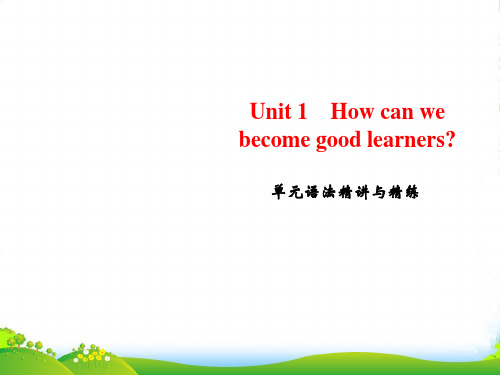
二、根据汉语意思完成句子。
1.我妈妈经常骑自行车去上班,我总是乘地铁上学。 My mother often goes to work _b__y__ __b_i_k_e__. I always go to school __b_y__ ___su__b_w_a_y__. 2.—你怎样备考?—我通过小组合作学习。 —__H__o_w__ do you study for a test? —I study __b_y__ _w__o_r_k_in_g__ with a group.
2.动名词在句中作宾语 动名词在句中作宾语时,一般放在某一及物动词或介词之后充当这一动词或 介词的宾语。 (1)后接动名词作宾语的及物动词有: finish,enjoy,keep,stand(忍受),suggest,advise,practice,mind,imagine 等。如: The tourists enjoy staying in Kunming all the year round.游客们喜欢一整年都 待在昆明。 Do you mind opening the window? 你介意打开窗户吗?
我们,还在路上……
now. A.speak
B.to speak
C.spoken
D.speaking
the old that he gave up his loudly when I passed by just
( D )3.(广州中考)Sarah,you'd better drink moБайду номын сангаасe water after
些善于独立思考的人,给那些具有锲而不舍的人。2022年4月上午2时49分22.4.1902:49April 19, 2022 • 3、书籍—通过心灵观察世界的窗口.住宅里没有书,犹如房间里没有窗户。2022年4月19日星期二2时49分10秒02:49:1019 April 2022
新目标七年级英语语法精讲精练与专项练习(全)

1. 中文名与英文名:【中文名】由两部分组成-----姓和名,如:Wang Lili一 ,Sun Wukong.中文名用汉语拼音写成,姓和名要分开写,开头字母都大写。
英文名与中文名顺序恰好相反,名字在前,姓在后。
如:Jim Alan GreenFirst name Middle name Last name︸ | |Given name(教名)Family name(姓氏)【英文名】一般由三部分组成:首名(first name)、中名(middle name)和尾名(last name),其中first name 和middle name是后起的名字,也叫given name(教名)。
Last name 是家族沿用的名字,也叫family name.【巧学妙记】先姓后名中文名,汉语拼音直写成,姓和名要分开写,开头大写才能行。
英文名,大不同,前面名字后面姓,首名称呼最常用,若要表示受尊重,Mr.Mrs.Miss.Ms.姓前用[专项演练]()1.My full name is Jerry Harry Potter. My first name is_and my family name is_.A .Jerry HarryB .Jerry PotterC .Potter Jerry()2.I’m Tom Green. You can call (称呼) me_A. Mr. TomB. Mr. GreenC. Green2.物主代词:在英语中,表示“你的,我的,他的,她的,它的,你们的,我们的,他们的”等意义的代词形式就叫物主代词。
物主代词是代词的在句中主要作主语,一般放在句首,说明是I am a student.我是一名学生。
She is my sister.她是我的妹妹。
He is in China now.他现在在中国。
【物主代词】分为两类,形容词性物主代词作用相当于形容词,在句中用于修饰名词,如my name ,your phone number ,his ruler ,her schoolbag.【巧学妙记】主格代词作主语,放在句首说明谁,I, we ,you ,he ,she ,it ,they,一共七个来打擂。
高考语法第六章 动词与动词短语精讲与精练

高考语法|第六章动词与动词短语精讲与精练(最新版)第六章动词与动词短语精讲与精练一、动词与动词短语讲前练:在空格处填入适当的单词(1个)Mr. Green has a beautiful garden. He keeps an eye [1]_________ it carefully every day. He thinks it [2]__________ sense to plant some vegetables in it. And he keeps the vegetables free from chemicals, which does good [3]_________ his health. His neighbors look [4]________ to Mr. Green, who often turn [5]_________ him for advice when they come [6]_______ problems,which can’t be figured [7]_________ on their own. This accounts [8]__________ Mr. Green’s kindness and popularity.Last Sunday I paid a visit to Mr. Green. He gave me some advice on how to get rid [9]______pests and take advantage [10]_________ the modern technology to produce tasty vegetables, which made me pleased.Keys:1.on 2.makes 3.to 4.up 5.to 6.across 7.out 8.for 9.of 10.of【account for说明,解释,导致 figure out 弄清楚,弄明白,计算出,解决】二、动词与动词短语考点精讲:动词与动词短语考点1、动词的分类:1.行为动词(1)及物动词(可以直接带宾语)He gave me some advice on how to get rid of pets.(2)不及物动词(不可以直接带宾语)A traffic accident happened on the Hong Xing road yesterday.2.系动词【系动词后常接形容词做表语,不接副词尤其是以ly结尾的副词作表语】1)、表示“是”的动词be。
人教新目标英语九年级全册 Unit 3 单元语法精讲与精练 含答案
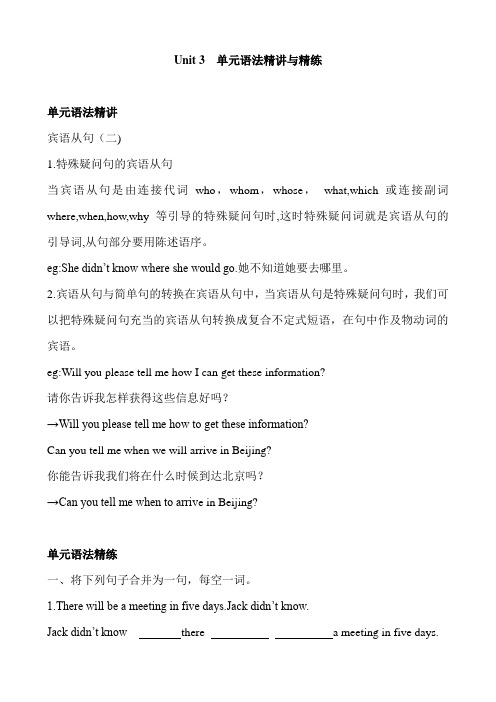
Unit 3 单元语法精讲与精练单元语法精讲宾语从句(二)1.特殊疑问句的宾语从句当宾语从句是由连接代词who,whom,whose,what,which 或连接副词where,when,how,why 等引导的特殊疑问句时,这时特殊疑问词就是宾语从句的引导词,从句部分要用陈述语序。
eg:She didn’t know where she would go.她不知道她要去哪里。
2.宾语从句与简单句的转换在宾语从句中,当宾语从句是特殊疑问句时,我们可以把特殊疑问句充当的宾语从句转换成复合不定式短语,在句中作及物动词的宾语。
eg:Will you please tell me how I can get these information?请你告诉我怎样获得这些信息好吗?→Will you please tell me how to get these information?Can you tell me when we will arrive in Beijing?你能告诉我我们将在什么时候到达北京吗?→Can you tell me when to arriv e in Beijing?单元语法精练一、将下列句子合并为一句,每空一词。
1.There will be a meeting in five days.Jack didn’t know.Jack didn’t know there a meeting in five days.2.Where is the city park? Could you tell me?Could you tell me the city park ?3.Are the children playing games? Tell me.Tell me the children games.4.How many people can you see in the picture? Who knows?Who knows how many people in the picture?5.What does he often talk about? The girl wondered.The girl wondered he often about.二、将下列句子合并为宾语从句。
2022年高考英语语法精讲与精练(句子成分和基本句型)
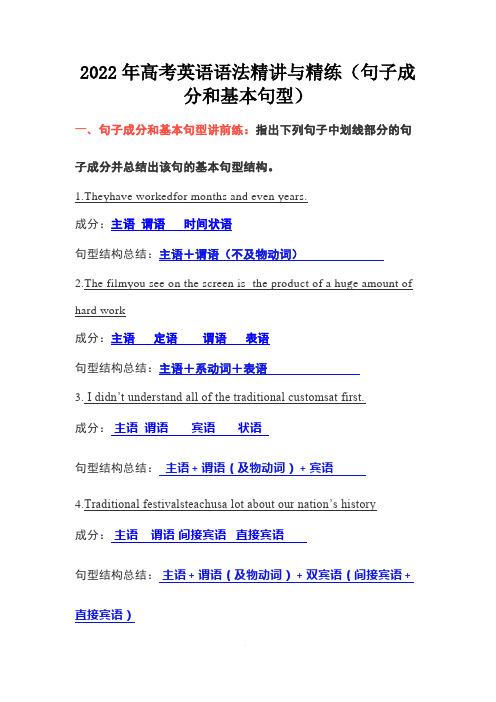
2022年高考英语语法精讲与精练(句子成分和基本句型)5.Traditional festivalsenableusto learn fine Chinese values成分:主语谓语宾语宾语补足语句型结构总结:主语+谓语+复合宾语(宾语+补语)小结:从以上的练习中可知英语中的句子成分包括:主语,谓语,宾语,表语,定语,状语,宾语补语二、句子成分和基本句型精讲(一)、句子成分:1、主语: 说明句子所谈的是:“什么人”或“什么物”,主语通常由名词、代词或相当于名词的词或短语充当。
EG:Lucy likes her new car very much. 露西喜欢她的新车。
【名词作主语】He goes to and from schoolby bike every day.他每天都起得很早。
(代词作主语)To learn English well is a challenge.学好英语是一项挑战性工作。
【不定式短语作主语】2、谓语: 说明主语“做什么”、“是什么”或“怎么样”,英语中谓语只能用动词充当。
例如:We work hard.我们努力工作。
The boy caught a bird. 那个男孩逮住一只鸟。
He is like his father. 他像他父亲。
注意:介词不能作谓语,必须与be动词连用,构成系表结构,一起作谓语。
谓语和主语在人称和数方面必须保持一致。
EG:Music is the utmost pleasure in life.音乐是人生最大的快乐。
As I take each bite, the sweet and mild flavour of the red bean filling slowly fills my mouth.3、宾语: 宾语是动作的对象。
由名词、代词或相当于名词的词或短语充当,说明主语做“什么”。
EG:Tom bought a story-book.汤姆买了一本故事书。
2022年高考英语语法精讲与精练( 冠词)
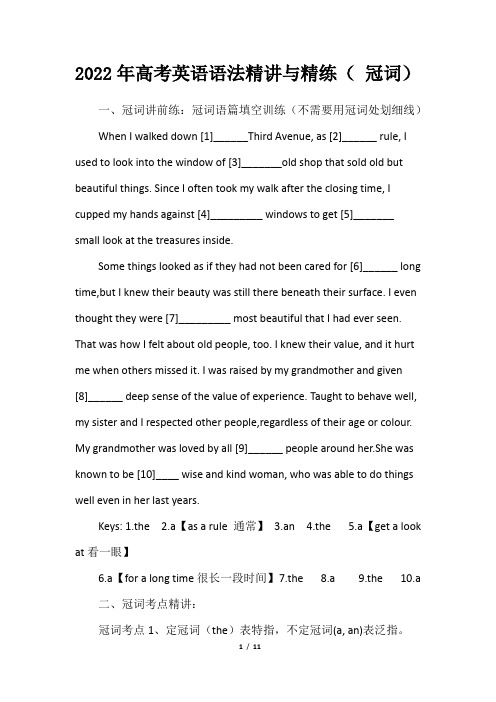
2022年高考英语语法精讲与精练(冠词)一、冠词讲前练:冠词语篇填空训练(不需要用冠词处划细线)When I walked down [1]______Third Avenue, as [2]______ rule, I used to look into the window of [3]_______old shop that sold old but beautiful things. Since I often took my walk after the closing time, I cupped my hands against [4]_________ windows to get [5]_______ small look at the treasures inside.Some things looked as if they had not been cared for [6]______ long time,but I knew their beauty was still there beneath their surface. I even thought they were [7]_________ most beautiful that I had ever seen. That was how I felt about old people, too. I knew their value, and it hurt me when others missed it. I was raised by my grandmother and given [8]______ deep sense of the value of experience. Taught to behave well, my sister and I respected other people,regardless of their age or colour. My grandmother was loved by all [9]______ people around her.She was known to be [10]____ wise and kind woman, who was able to do things well even in her last years.Keys: 1.the 2.a 【as a rule 通常】3.an 4.the 5.a 【get a look at看一眼】6.a 【for a long time很长一段时间】7.the8.a9.the 10.a二、冠词考点精讲:冠词考点1、定冠词(the)表特指,不定冠词(a, an)表泛指。
hsk语法精讲精练

hsk语法精讲精练HSK语法精讲精练一、HSK简介HSK,即汉语水平考试(Hànyǔ Shuǐpíng Kǎoshì),是中国对外汉语教育的国家性标准化考试。
它主要考察考生的汉语水平,包括听、说、读、写四个方面。
HSK考试分为六个级别,从HSK1级到HSK6级逐渐提高。
二、HSK语法精讲1. 语序汉语的语序是主谓宾结构,即主语+谓语+宾语。
在汉语中,主语和谓语的位置是固定的,而宾语的位置可以灵活调整。
例如:“我喜欢吃水果。
”,“吃水果,我喜欢。
”这两个句子的意思是一样的,只是宾语的位置发生了变化。
2. 时态汉语的时态有现在时、过去时和将来时。
现在时表示现在正在进行的动作或状态,过去时表示过去发生的动作或状态,将来时表示将来要发生的动作或状态。
例如:“我现在在学习汉语。
”,“昨天我去了北京。
”,“明天我要去上海。
”3. 动词的使用在汉语中,动词的使用非常灵活,一个动词可以表示多种不同的意思。
例如:“看”这个动词可以表示看电影、看书、看朋友等不同的动作。
4. 量词在汉语中,名词前面通常要加上一个量词才能完整表达。
量词可以表示数量、单位或形状等。
例如:“一本书”、“两个苹果”。
5. 介词汉语中的介词用来表示名词与名词、名词与动词之间的关系。
常见的介词有“在、上、下、里、外、前、后”等。
例如:“我在教室里学习。
”,“书放在桌子上。
”三、HSK语法精练1. 完成下列句子。
- 你昨天去哪儿了?- 我昨天去了超市买东西。
- 你喜欢什么颜色的衣服?- 我喜欢穿黑色的衣服。
- 你家有几口人?- 我家有四口人。
2. 选择正确的词语填空。
- 我们______每天都要去上课。
(A. 通常 B. 昨天 C. 每天)- 他______要学习汉语。
(A. 现在 B. 昨天 C. 将来)- 你______喜欢吃什么水果?(A. 现在 B. 昨天 C. 将来)3. 根据图片选择正确的量词。
- 一______书 (A. 本 B. 个 C. 条)- 两______苹果 (A. 个 B. 本 C. 条)4. 将下列句子按正确的顺序排列。
初中英语语法精讲精练

一、一般现在时1. We won’t go unless you_______ soon.A. comingB. cameC. will comeD. come2. Japan ________ to the east of China.A lieB lies C. lying D. lied3. The plane to Shanghai _________ at 8:30.A. leavesB. leavingC. will leaveD. leave二. 一般过去时4. It ______ Yang Liwei about 21hours _____ the earth 14times in his spaceship.A. spent; circlingB. took; traveling.C. spent; to travel.D. took; to circle.5. —Your phone number again? I _____ quite catch it. —it’s 69568442.A didn’t B. couldn’t C. don’t. D. can’t.6. He said he______ me a present unless I ________ in doing the experiment.A. had not given; had not succeededB. would not give; succeed.C. will not give; succeedD. would not give; will succeed.7. There _____ no bus stop here year.A. isB. was.C. areD. were8. She said that they_____ a good time.A .had B. has C. have D. will have9. Mike _____ until his father came back.A. went to bed.B. doesn’t go to bed.C. didn’t go to bedD. wouldn’t go to bed.10. My sister________ and _____ herself when she was riding her bike yesterday.A. falls… hurt.B. falls…hurts.C. has fallen… hurt.D. fell…hurt.11. He __________ with us yesterday morning.A. doesn’t go swimming.B. goes swimming.C. didn’t go s wimming.D. went to swimming12. _____ your parents in Shanghai last year?A. IsB. AreC. WasD. Were13. Tom ______ (match) TV at home last night. He _____ (go ) nowhere.14. When I ______ (be) young, I often ______ (play) football. 15. He _______ (be) not with me at that time.16. She ______(give) Mary a present last Christmas.17. It ______ (happen) an hour ago.18. They ________ (go ) to the par last Sunday.19. I __________ (have) a good time last holiday.20. Mrs. Li _______ (live) here many years ago.21. ____ he ____ (do) his homework yesterday? No, he _____(not finish) it.22. Father_______ (get) a letter from my sister last week.23. Who ________ (break) the window just now?24. It was very cold, so he ________ on his coat (put).25. The bed wasn’t good, I_____ very well. (sleep).26. Bob was very wasn’t interesting. They____ in very much. (enjoy)27. I went to Lily’s flat, but she ________ there (be).28. He was in a hurry, so she __________time to cook for you (have).三. 一般将来时.28. When we get our tickets, be marked “first class” ______.A. it is to.B. it will.C. they were to.D. they will.29. Look! The woman with curl hair over there _____ us a talk about DNA.A. is about to give.B. would give.C. was going to give.D. had given.30. She ______ me _______ at the airport this evening.A. is seeing; out.B. is seeing; off.C. sees; off.D. will see; out.31. She _____ to the cinema with her classmates tomorrow evening.A. went.B. would go.C. has gone.D. will go.32. There______ a basketball match in our school the day after tomorrow.A. will have.B. will be.C. is going to have.D. would be.33. They______ a new bridge over the river next year.A. have built.B. are going to build.C. are building.D. were going to build.34. We ______ to the Great Wall f it_____ tomorrow.A. don’t go; rains.B. won’t go; rains.C. are building.D. go; doesn’t rain.35. Either you or he_____ there tomorrow.A. go.B. goes.C. are going.D. is going.36. A present ______ to me by Mother next week.A. will give.B. is given.C. will be give.D. will be given.37. I won’t______ (be) free tomorrow.38. The students_____ (have) a meeting this weekend.39. Lily ______( stay) with me tonight.40. It’s going to _____(rain) this evening.41. We are going to ______ (visit) the Summer Palace next Monday.42. She is going to ______( help) Tim again on Sunday.43. Jim ______(see) a film tomorrow.44. We ______(visit) our teacher next Sunday.45. _______ you _______(need) me to help you?46. They ______(not go ) there if it snows tomorrow.47. There _______ (be) a meeting tomorrow morning.48. She_____ (come) here soon.四.过去将来时.49. They _______ the game when rain.A. were about to start.B. were about start.C. were to starting.D. was about to starting.50. He was 8. In two years he _____10.A. will goB. would goC. has goneD. goes51. The teacher said that she ______ us to the park the next day.A. will take.B. has taken.C. would take.D. is taking.52. Mr. Brown asked who ____ the message to Mr. Evans.A. was going to talkB. has takenC. could giveD. will tell53. —What did the scientist say?—He said he wondered if_____ into space by spaceship one day.A. he had to fly.B. he could fly.C. can he fly.D. could he fly.54. He said there_____ another new school near the soon.A was. B. had been. C. would be. D. was having.55. He told us that he_____(go) to London next month.56. She said there ______(be) a new play that evening. 57. Mrs. Lee hoped that her son_____(come) to see her very soon.58. We asked them what_____(happen) next.59. That woman bodyguard told when she ______( let) us in if we could show herthe passes.60. Tony wanted to know when she ______( visit) the exhibition again.五.现在进行时61. Dictionary __________ I have looked for it everywhere but still _________it.A. has lost; don’t find.B. is missing’ don’t find.C. has lost; haven’t found.D. is missing; haven’t found.62. My wife __________.A. has forever criticized me.B. forever criticizes me.C. does forever criticize me.D. is forever criticizing me.63. Look! Li Lei ______ Jim with his Chinese.A. is helping.B. has helpedC. is going to help.D. would help.64. Stay here boy Don’t go o ut It ______ now.A. will rain.B. is going to rain.C. has rained.D. is raining.65. The students of Class 3______ a football game now Let’s go and watch it.A. are having.B. will have.C. is having.D. will be had.66. Miss Gao _____ she’s w orking.A. isn’t sleeping.B. doesn’t sleepC. is sleepingD. sleeps.67. The child ____ on the same clothes?A. put on.B. putting onC. went.D. wearing.68. Are all the twins ______the same clothes?A. put on.B. putting on.C. wear.D. talls.69. The students____(read) English in the classroom now.70. “What are you doing here?” “I _____(wait) for Tom.”71. Those students ______ (work) in a factory these days.72. More and more American people______(give) up smoking.73. Ms Lee ____(come) to see us tomorrow And she ______ (leave) for Beijing theday after tomorrow.74. The Whites ______(go ) to the concert this coming Saturday.75. Look. A boy ______(write) on the wall.76. Listen The baby_______(cry).77. ______they _____ (do) their homework now?78. ——What ______he _______(play) now?——He_______ (play) basketball.79. Jenny ________(not watch) TV now.80. Don’t make any noise My father ______(sleep).六.过去进行时.81. ——I didn’t see you at the meeting yesterday, why?——I ____for a long distance call then from my from my daughter in Canada.82. Mary _____a dress when she cut her finger.A. made.B. is making.C. was making.D. makes.83. As she _____ the newspaper Granny ____ asleep.A. read; was falling.B. was reading; fell.C. was reading; was falling.D. read; fell.84. James has just arrived but I didn’t know he______ until yesterday.A. will come.B. was coming.C. had been coming. D, comes.85. When the teacher came in the students______A talkB are talkingC were talkingD will talk86. ——Were you writing a letter at 9 last night? ——No, I ______.A. were.B. was.C. wasn’tD. weren’t.87. Wang Lin and Hong ________ for us when we got to the school gate.A. is waiting.B. were waiting.C. are waiting.D. was waiting88. My mother ______ breakfast while I ______ face this morning.A. cooked; was washing.B. was cooking; was washing.C. was cooking; washed.D. would cook; was washing.89. Joan ______ Tom with his lessons at this time yesterday.A. was going to help.B. was helping.C. would help.D. has helped.90. When I went to Linda’s She____ in bed reading.A. is lying.B. has lain.C. is going to lie.D. was lying.91. He ______(do) his homework at two o’clock yesterday afternoon.92. They_____(have) a meeting from 8 to 10 last night. 93. Mary_____(watch) TV when we came in.94. I ______( wash) my clothes this time yesterday.95. At that time the boy______(play) football.96. While we______ (talk) with Mr. Wang in English, a foreigner came up.七现在完成时.96. —What a nice bike! How long ____ you _____ it? —Just two weeks.A. will; buy.B. did; buy.C. are; having.D. have; had.97. —Do you know our town at all? —No this is the first time I________ here.A. was.B. have been.C. came.D. am coming.98. ——Have you ______ been to our town before?——No, it’s the first time I _____ here.A. even; come.B. even; come.C. ever; come.D. ever; have come.99. ——May I go to play tennis with you, Dad?——_____ you _____ your composition yet?A. Are; finishing.B. Did; finish.C. Will; finish.D. Have; finished. 100. You don’t need to describe her I ________ her several times.A. had met.B. have met.C. met.D. meet.101. ——I’m sorry to keep you waiting.——Oh, not at all. I _____ here only a few minutes.A. have been.B. had been.C. was.D. will be.102. Mr. Li isn’t here. He ____ to England.A. has been.B. have been .C. has gone.D. have gone. 103. Mike ______ several places since he came to Beijing.A. will visit.B. has visited.C. is visiting.D. visited.104. ——_____your brother_____ a new watch? ——Not yet.A. Have; was.B. Did; buy.C. Has; bought.D. Will, buy. 105. He _____ here in 1980. He _____ a teacher for over twenty years.A. came; was.B. came; has been.C. has come; is.D. has come; has been. 106. Lucy _____ many friends since she went to Paris.A . made. B. is going to make C. has made. D. makes.107. She _____ the dictionary to Alice yet.A. has retun ed.B. hasn’t retuned.C. would returnD. returned.108. She said, “I’m sorry to hear that he_____ ill for two weeks.”A. has been.B. had been.C. was.D. will be. 109. ——Mum? May I go out and play basketball?——______ you _____ your homework yet?A. Do; do.B. Are; doing.C. Did; do.D. Have; done. 120. He ______(go) to see Ms Lee and he’ll be back in two hours.121. Great changes ______ (take) place in my hometown since 1996.122. Ms Black ______(teach) maths for 21years.123. He ______(be) to Paris five times.124. He joined the army then he was 18. He _____(be0 an army man many years. 125. I don’t want to see the film because I ______(see) it I saw it last Monday.126. He______(live) in Beijing since he was born.127. We_______ (not hear) from them for a long time.128. The Greens______ (be) to Shanghai twice.129. Where is your father? He _____(go) to England.130. How long____ you____ (learn) English?131. They _____(not see)for years.八.过去完成时.132. The students____ busily when Miss Brown went to get a book she _____ in the office.A. had written; left.B. writing; has left.C. had written; had left.D. were writing; had left.133. I had hoped _____ my letter.A. her to answer.B. that she answer.C. that she would answer.D. her answering.134. By the time school _____ over, the rain_____, so I didn’t use my raincoat.A. has been.B. had been.C. be.D. would be.135. The film _____ on for ten minutes when Jack got to the cinema.A. has been.B. had been.C. be.D. would be.135.——Did you _____ the concert last night?——V ery much I _____ to a concert for a long time.A. enjoy; haven’t gone.B. enjoy; haven’t been.C. enjoy; hadn’t gone.D. enjoyed; didn’t go.136. It_____ nice to see John yesterday I ____ him for a long time.A. was; haven’t seen.B. had been; haven’t seen.C. was; hadn’t seen.D. had been; hadn’t seen.137. Last right I ____ studying at 9:30 Bill came at 9”50 By the time ca me I _____ my homework.A. finished; finished.B. would finish; finished.C. had finished; had finished.D. finished; had finished.138. He told me he ____ (meet) her before.139. She thanked me for what I ____( do) for her son.140. I ____(learn) 300 English words by the end of last month.141. He____ (leave) his office when I arrived there.142.She ____ (visit) the city three times before she died in 1997.143. They knew she _____ (borrow) a lot of money for her daughter.144. We _____(give) some flowers for our teachers last Teacher’s Day.145. What ______you_____(do)`tomorrow?146. I ______(drink) a bottle of orange yesterday.147. He______ (go) to the zoo last Sunday.148. Look Tom______(draw) a picture.149.Kate______(write) a letter now.150. Listen who _____(sing) an English song?151. She_____(catch) the first bus every morning.152. They often _____(fly) kites in spring.153. He_____(be) an American boy He _____(come) from New York.154. He is in Beijing now He often_____(write)letters to his in English.155. Don’t make any noise Your father_____(work).156. We_____(know) each other since ten years ago.157. I heard that Jim ______(go) to England the next year.158. They_____(take) that old man to the hospital last Monday.159. It______(rain0 hard when I went home the day before yesterday.160. When we got to the cinema, the film____ already ___(begin).161. Who ____(teach) us English next term?162. 1 _____(not tell) him anything.163. ______ you ______(like) something to drink Mary?164 He_____(can come) earlier tomorrow morning.165. There ____(be) sure he______(find) a good job when he _____(return) to his home.166. I_____(be)sure he_____(find)a good job when he_____(return) to his home-town. 167. ——How many times _____ your sister _____(be) to the Summer Palace?——Twice She ____(go) there in 2003 and 2006168.I _____(be) sorry______(hear) that you ______(be) ill for two days,. If you ____(not feel) well tomorrow you _____(not go) to work..169. Look that boy_____ (make) faces.170. Tom draws best in his class _____he?171.One day a farmer______ (walk) in a mountain near his home when he_____(see) a ba-by bird.172. My mother said she ______(do) some waking if it ______( not rain) the next day. 173.Tom ____(go) to Shanghai already I think he_____-(write) to me as soon as he______(reach)there.174. I don’t know your friend Jack I _____never_____(meet)him.175. After he had read this book he _____(return)it to the library.176 .She always______(get0 on well with her classmates.177. Don’t worr y He______(catch) up with the other soon.178. The glass is broken It _______(break) by my brother.179. Students_____(have)ten minutes’ rest between classes.180. What_____ you______(do) when I called you yesterday evening?181. Look! The train ______ just_____(arrive).182. She_____ ______ (pick) apples in her garden when we went to see her yesterday. 183. Please be quick or you _____ (be) late for the meeting.184. I _____ (read) the book already How long____ you______(read) it?185. Could you tell me what time he____(come) tomorrow? Please let me know as b soon as he ____ (come) here tomorrow.186. There ____(be) great changes I our city since 1978.187. My son studies in CanadA I ______-(not hear) from him for a long time. 188. Thanks a lot It’s rainy a gain It_______(rain0 for a long time.189. Look! They ____(dig) potatoes in the fields.190.We_____(have) a good time in Kunming on May Day this year.191. In much of China winter_____(last) from November to January. 192.——Shall we go on a picnic this weekend?——Good idea unless it _____.A. rains.B. will rain.C. doesn’t rain.D. won’t rain.193. ——Hi Kate You look tired What’s the matter?——I _____ well last night.A .didn’t sleep B. don’t sleep C. haven’t slept D. won’t rain.194. ——Have you read this book?——Yes, I ____it two weeks ago.A. is reading.B. have read.C. will read.D. read.195. ——Is this your coat, sir?——No, Mine____ over there near the window.A. hangs.B. is hangingC. will read.D. read.197. Frank _____ a film he’s free next Saturday.A. see.B. saw.C. has seen.D. will see.198. Could you please tell me how soon______?A. is your brother back from BritainB. your brother is back from Britain.C. will your brother be back form Britain.D. your brother will be back from. Britain199. Bad luck! We______ Mount Emei when it rained heavily.A. climbed.B. were climbing.C. are climbingD. have climbed. 200. ——Is that Jack speaking?——Sorry, he______ London But he’ll be back in two days.A. has been to.B. has changed.C. has been in.D. went to. 201. ——Do you know where the twins are?——Yes They _____ Fuzhou.A. have gone to.B. have been toC. have borrowed.D. went to. 202. ——When did you borrow the English story –book?——I borrowed it last week I _____ in for a week.A. have been toB. has gone toC. has been inD. had.203. ——May I speak to Mr Green?——Sorry, he _____London But he’ll be back in two days.A. has been toB. has gone to.C. has been inD. went to. 204. Since 2000 Nanchang has become a new city Everything ______.A. is changed.B. was changedC. has changedD. had changed. 205. Mr Read knows Taizhou very well He____ here many times.A. is.B. will come.C. came.D. has been. 206. Henry ____ a birthday card for Sam yesterday.A. has bought.B. buys.C. bought.D. will buy. 207. It’s winter now but it _____ in my hometown.A. snows.B. isn’t snowingC. snowedD. doesn’t snow. 208. Tom ______ his homework after breakfast.A. don’t.B. doesn’t.C. don’t do.D. doesn’t do. 209. Jenny_____ a letter to her mother three days ago.A. wrote .B. writes. C .write. D. has written. 210. He____ with us yesterday morning.A. doesn’t go swimm ing.B. goes swimming.C. didn’t go swimming.D. went to swimming.211.Mr friend _____ the army in 1989.A. joins.B. join.C. joined.D. has joined. 212. There _____a basketball match in our school the day after tomorrow.A. will have.B. will beC. is going to haveD. would be. 213._______ you _____ us a talk this afternoon?A .Are; going B. Are; given C. Will; give D. Were; going to give 214. Don’t make any noise Grandma_____.A. has sleptB. is sleptC. will sleepD. is sleeping. 215. Mike______ several places since he came to Beijing.A will visitB has visitedC is visiting D. visited216 ——Where’s your father? ——He______ to ParisA goB goesC wentD has gone217 ——____your brother _____a new watch?——Not yetA. Have; bought.B. Did; buy.C. Has; boughtD. will; buy.218. Great changes ______ in our city since 1980.A. have taken placeB. has taken place.C. took placeD. will take place. 219. He______ here in 1980 He_____ a teacher for over ten years.A. came; was.B. came; has beenC. has come; is.D. has come; has been.220. She _____ the dictionary to Alice yet.A. has returned.B. hasn’t retuned.C. would return.D. returned.221. She said: ”I’m sorry to hear that he_____ ill for two weeks.’A. has been.B. had been.C. was.D. will be.222. Bill was listening to the radio while Ann _____TV.A. watched.B. has watchedC. was watching.223.As soon as I get there I ____you.A. telephone.B. telephoned.C. have telephoned.D. will telephone. 224. I ____ ill last week.A. am.B. will be.C. was.D. were.225. He said that he____ the book to the library.A. returns.B. returned.C. has returned.D. will return. 226. The teacher said the earth____ around the sun.A. move.B. moved.C. moving.D. moves.227. I’ll come to see you as I ______ back.A .will be. B. am being. C. was. D. am.228.I’m very glad because I have______ my lost key.A. founded.B. found.C. find.D. finded.229.It was said that the Second World War_____ out in 1939.A. break.B. found.C. broken.D. was broken. 230. When I ____ along the street I happened to meet an old friend.A. will come.B. is coming.C. are watchingD. watching.231. I’ll tell Mrs Green about it as soon as she_______ back.A. will come.B. is coming.C. are watching.D. watches.232. They usually_____ TV in the evening.A. watch.B. will watch.C. are watching.D. watches.243. ——He came early this morning didn’t he?——Yes, he diD He often ____to school early.A. come.B. comes.C. came.D. has come. 244. This is Miss Gao She___ your new teacher.A. be.B. does.C. isn’t.D. doesn’t.245. ——Hi Kate.——Hi Mary I____ you arte here.A. don’t knowB. don’t think.C. think.D. didn’t know. 246. Mother said that cooking ______much time every day.A. paid.B. spent.C. made.D. took.247. He_____ wait until the rain_______.A. won’t; will stop.B. won’t stop.C. will; stops.D. will; will stop.248. If it _____ tomorrow I’ll go by car.A. rainB. will rain.C. rains.D. would rain. 249. There_______ a table with three legs in Jenny’s room.A. isB. are.C. hasD. have.250. Mike had nothing for breakfast_______?A. does heB. did he.C. didn’t heD. had he.251. I don’t know if she ______me when she_______.A. tells; arrivesB. tells; will arrive.C. will tell; will arriveD. will tell; arrives.252. If she_____ get up early enough she will not be able to catch the early bus.A. doesn’t.B. didn’t.C. won’t.D. don’t.253. What did you did last night she will not be able to catch the early bus.A. doesn’t.B. didn’t.C. won’t.D. don’t.254. The Whites _____ many places of interest since they came to China.A. have visitedB. will visit.C. visited.D. visit.255. They _____ home two hours ago.A .go. B. went. C. going. D. goes.256.Never trouble me while I ______ in my room!A. will sleep.B. asleep.C. am sleeping.D. slept.257. ——Where’s Li Lei?——He_____ his sports shoes in the room He____ football with his friends.A. is putting on; is playing.B. puts on; will play.C. is putting on; will play.D. put on; played.258. He has____ for two years Two years____ a long time.A. left home; are.B. left home; is.C. been away from home; is.D. been away from home’ are.259 How long _____the film_______?A .did; begin. B. has; begun. C. has; been on. D. has; been. 260. ——How do you like Beijing Mr Black?——Oh, I ____________ Such a beautiful city.A. don’t visit.B. didn’t visit.C. haven’t visited.D. hadn’t visite d.261. ——I have bought an English – Chinese dictionary.——When and where ____you _____it?A. do; buy.B. did; buy.C. have; bought.D. will; buy.262.When_____ the accident______ ?A. was; happened.B. has; happened.C. did; happen.D. was; happening. 263.It’s seven o’clock Jim _____ lunch now.A. is having.B. are having.C. have.D. has.264. _____ he_____ the doctor the day before yesterday?A. Have; seen.B. Has; seen.C. Did; see.D. Does; see. 265.They won’t go to the Great Wall if it____ tomorrow.A. rain.B. raining.C. rains.D. will rain.266.Mr. Black _____China for many years.A. has been to.B. has gone to.C. has been in.D. has come to. 267. That building _____ two years ago but it looks quite old now.A. built.B. was built.C. is built.D. builts268. How long____ you______ the bicycle? About two weeks.A. have; had.B. have; bought.C. did; buy.D. have; get. 269.The old woman____ for ten years.A. has died.B. was dyingC. diedD. has been dead.270. I ___ you for a long time Where______ you_______?A. didn’t see; did; go.B. didn’t see; have; gone.C. haven’t seen; have.D. haven’t seen; have; gone been.271. ——Where were you I July last year?——This time last year my family and I _____my grand parents in New YorkA. was visiting B visited. C. had visited. D. were visiting.272. There ____ a parents meeting tomorrow afternoon.A .are. B. will have C. is going to be.273. He asked me______ during the winter holidays.A. where I had gone.B. where I had been.C. where had I gone.D. where had I been.274. I don’t think if he_______ here next week.A. comes.B. came.C. will come.275. He______ to your office tomorrow afternoon please wait for him.A. comingB. will.C. will come.D. come.276. Li Hua ______ in the factory since she left school ten years ago.A. works.B. worked.C. has workedD. had worked.277.She says that she ______ to Beijing next week.A. has gone.B. will go.C. goes.278.My uncle _____ to see me He’ll be here soon.A. is coming.B. comes. C .has come . D. came.279. Tudy ______ the Great Wall twice and now she still _____ to go there.A. went to; wanted.B. goes to; wants.C. has gone to; wants.D. has been to; wants.280.We______TV when the telephone_____.A watched ; was ringing. B. were watching; rang.C watch; rings.D are watching; rang.281. ——When ____ Mr. Harris _____the town for Sydney?——I think it_____ last December.A. did; leave; was.B. did; leave; is.C. has; left; was.D. does; leave; is. 282. Listen! Someone_______ in the next room.A. cryB. is crying.C. are crying.D. crying.283. Look! The bird_____ in the next room.A. cry.B. is crying.C. are crying.D. crying. 284. It’s seven o’clock Tim______ breakfast now.A. is havingB. are having.C. have.D. has.285. ——You’ re smoking No one______ me but you.——Only at home No one_____ me but you.A. is seeing.B. had seen.C. sees.D. saw.286. The class______ before Tom _______into the classroom.A. began; was talking.B. had begun; walked.C. begins; walks.D. was beginning; walked.287. Mr Li is out But he____ here ten minutes ago.A.went.B. has gone.C. has been.D. would go. 288. Miss Gao isn’t here She______ to the station to meet Mr Brown.A. went.B. has gone.C. has been.D. would go. 289. I ____ a letter from him since he left.A. didn’t haveB. haven’t got.C. didn’t have.D. haven’t heard. 290. If my parents_____ free tomorrow we_____ for a picnic.A. are; go.B. are; will go.C. will be; will go.D. will be; go. 二被动语态.291. Your bike needs_______.A. to repair.B. to be repaired.C. repaired.D. repairing. 292 Girls ______.A. are wanted.B. wanted.C. wanting.D. are wanting. 293. Enough_____ here of this issue.A. has been saidB. have been said.C. has said.D. was said. 294. China _______ in 1949.A. liberatedB. is liberatedC. was liberatedD. liberated. 295.Children ______ in China.A. is taken good care.B. have taken good care.C. are taken good care of.D. must take care of.296. The bridge______ by the peasants themselves in 1980.。
高考英语语法精讲与精练:并列句、强调句及其它句式
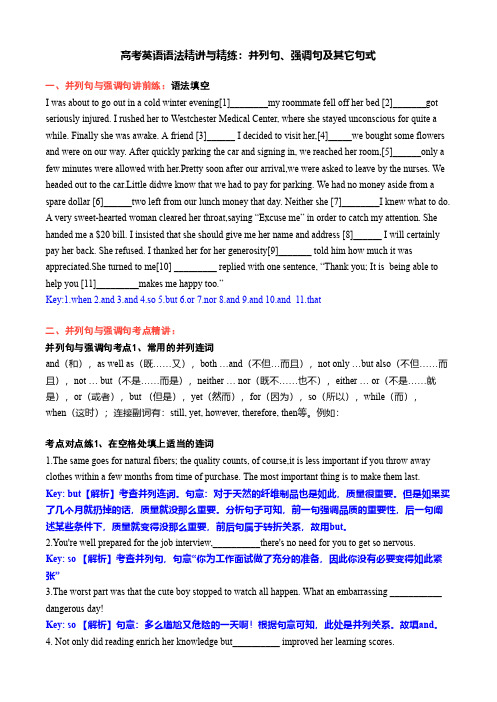
高考英语语法精讲与精练:并列句、强调句及其它句式一、并列句与强调句讲前练:语法填空I was about to go out in a cold winter evening[1]________my roommate fell off her bed [2]_______got seriously injured. I rushed her to Westchester Medical Center, where she stayed unconscious for quite a while. Finally she was awake. A friend [3]______ I decided to visit her,[4]_____we bought some flowers and were on our way. After quickly parking the car and signing in, we reached her room,[5]______only a few minutes were allowed with her.Pretty soon after our arrival,we were asked to leave by the nurses. We headed out to the car.Little didwe know that we had to pay for parking. We had no money aside from a spare dollar [6]______two left from our lunch money that day. Neither she [7]________I knew what to do.A very sweethearted woman cleared her throat,saying “Excuse me” in order to catch my attention. She handed me a $20 bill. I insisted that she should give me her name and address [8]______ I will certainly pay her back. She refused. I thanked her for her generosity[9]_______ told him how much it was appreciated.She turned to me[10] _________ replied with one sentence, “Thank you; It is being able to help you [11]_________makes me happy too.”Key:1.when 2.and 3.and 4.so 5.but 6.or 7.nor 8.and 9.and 10.and 11.that二、并列句与强调句考点精讲:并列句与强调句考点1、常用的并列连词and(和),as well as(既……又),both …and(不但…而且),not only …but also(不但……而且),not … but(不是……而是),neither … nor(既不……也不),either … or(不是……就是),or(或者),but (但是),yet(然而),for(因为),so(所以),while(而),when(这时);连接副词有:still, yet, however, therefore, then等。
[全]高考英语语法精讲与精练-代词[全考点]
![[全]高考英语语法精讲与精练-代词[全考点]](https://img.taocdn.com/s3/m/d8571e04770bf78a64295477.png)
高考英语语法精讲与精练-代词一、代词讲前练:代词语篇填空训练What on earth does happiness mean?I can’t give you its exact definition, but I’m sure if you love and help [1]___________, you will get it. I’ll never forget an old lady. She lives in a small house alone.It’s said that her husband and her son died in a road accident years ago.[2]_______life is bitter, but she often helps others with a smile. Whenever it snows, [3]________ is always the first to clean the paths.She looks after several children living nearby. I am one of [4]_______. I often remember the stories she told us and her kind smile. Perhaps she is unlucky, but I think she is a happy person. Her life is full of laughter and love.But I’m sad to see some people getting [5]________ happiness in bad ways. They talk noisily in cinemas and meeting rooms; they destroy trees to enjoy[6]__________and they laugh at [7]_______ shortcomings. Perhaps they feel happy at that time, but they will never get true happiness because they have lost their personality already. Now I know [8]_________ happiness is.[9]_________ means kindness,love and unselfishness. Aboveall, I have come to understand that bringing happiness to others is getting [10]___________ happiness.Keys:1. others 2. Her 3. she 4.them 5.their 6.themselves 7.others’8.what 9. It 10.ourselves二.代词考点精讲1. 人称代词,物主代词,反身代词的用法:含有反身代词的短语有:be oneself (人)处于正常状态by oneself 独自地; 单独地come to oneself苏醒过来; 醒悟过来; 恢复理性for oneself 为自己; 独力地; 亲自地seat oneself 坐下speak to oneself 自言自语dress oneself 自己穿衣devote oneself to 致力于....enjoy oneself 过的快活help oneself to 随便吃、随便用teach oneself 自学make oneself at home 不受约束say to oneself 心里想2.指示代词及疑问代词1)指示代词主要有:①近指:this这个,these这些;也可指下文将要谈到的人或物。
fce语法与词汇精讲精练
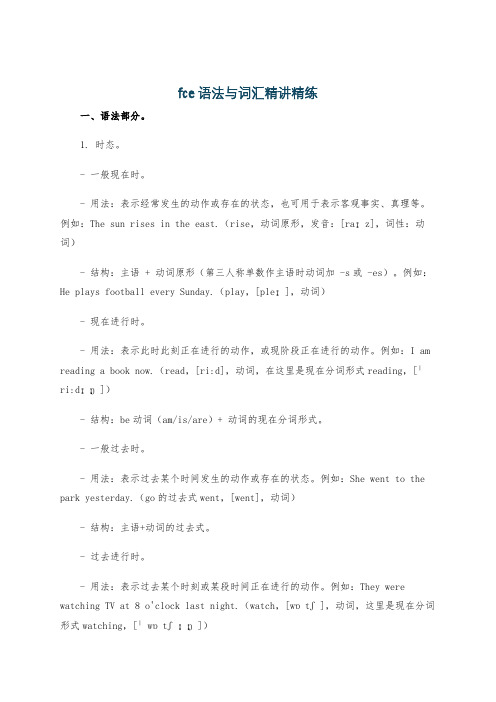
fce语法与词汇精讲精练一、语法部分。
1. 时态。
- 一般现在时。
- 用法:表示经常发生的动作或存在的状态,也可用于表示客观事实、真理等。
例如:The sun rises in the east.(rise,动词原形,发音:[raɪz],词性:动词)- 结构:主语 + 动词原形(第三人称单数作主语时动词加 -s或 -es)。
例如:He plays football every Sunday.(play,[pleɪ],动词)- 现在进行时。
- 用法:表示此时此刻正在进行的动作,或现阶段正在进行的动作。
例如:I am reading a book now.(read,[ri:d],动词,在这里是现在分词形式reading,[ˈri:dɪŋ])- 结构:be动词(am/is/are)+ 动词的现在分词形式。
- 一般过去时。
- 用法:表示过去某个时间发生的动作或存在的状态。
例如:She went to the park yesterday.(go的过去式went,[went],动词)- 结构:主语+动词的过去式。
- 过去进行时。
- 用法:表示过去某个时刻或某段时间正在进行的动作。
例如:They were watching TV at 8 o'clock last night.(watch,[wɒtʃ],动词,这里是现在分词形式watching,[ˈwɒtʃɪŋ])- 结构:be动词(was/were)+ 动词的现在分词形式。
- 现在完成时。
- 用法:表示过去发生的动作对现在造成的影响或结果,或者表示从过去开始一直持续到现在的动作或状态。
例如:I have lived here for five years.(live,[l ɪv],动词,这里是过去分词形式lived,[lɪvd])- 结构:have/has+动词的过去分词形式。
- 过去完成时。
- 用法:表示在过去某个时间或动作之前已经发生或完成的动作。
